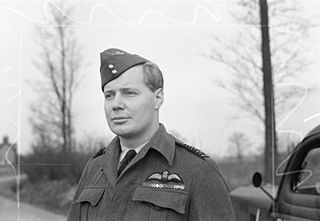Related Research Articles
Air Chief Marshal Sir John Alexander Carlisle Aiken, was a senior Royal Air Force (RAF) officer, and the Commander of British forces in Cyprus at the time of the Turkish invasion of the island in 1974.

Marshal of the Royal Air Force Sir William Forster Dickson, was a Royal Naval Air Service aviator during the First World War, a senior officer in the Royal Air Force during the inter-war years and a Royal Air Force commander during and after the Second World War. Dickson was Chief of the Air Staff in the mid-1950s, in which role his main preoccupation was the establishment of the V Force and the necessary supporting weapons, airfields and personnel. He also served as the first Chief of the Defence Staff in the late 1950s.

Marshal of the Royal Air Force Sir Thomas Geoffrey Pike, was a senior officer in the Royal Air Force. He served in the Second World War as a night fighter squadron commander and then as a station commander. He was Chief of the Air Staff in the early 1960s and, in that role, deployed British air power as part of the British response to the Brunei Revolt. Also, in the face of escalating costs, he implemented the cancellation of the British Blue Streak ballistic missile system but then found the RAF was without any such capability when the Americans cancelled their own Skybolt ballistic missile system. He went on to be Deputy Supreme Commander Supreme Headquarters Allied Powers Europe in the mid-1960s.

Air Chief Marshal Sir Anthony John Crowther "Tony" Bagnall, is a retired senior Royal Air Force officer and former Vice-Chief of the Defence Staff.
Air Chief Marshal Sir John Gingell, was a senior Royal Air Force commander and Gentleman usher of the Black Rod.
Air Chief Marshal Sir John Frederick Willis was a senior Royal Air Force officer.
Air Chief Marshal Sir Anthony Wilkinson Heward, was a senior Royal Air Force (RAF) commander.

Air Chief Marshal Sir Alfred Earle, was a senior officer in the Royal Air Force during the Second World War who later served as Vice-Chief of the Defence Staff (1964–66), and Director General of British Defence Intelligence (1966–1968).
Air Chief Marshal Sir Henry Neil George Wheeler, was a senior Royal Air Force (RAF) officer.

Air Marshal Sir Peter Guy Wykeham, was a Royal Air Force fighter pilot and squadron commander, and a flying ace of the Second World War. He was credited with 14 and 3 shared aerial victories.
Air chief marshal Sir Walter Lloyd Dawson, was a senior commander in the Royal Air Force in the 1950s. He was the last RAF commander in Palestine, before the creation of the State of Israel.

Air Chief Marshal Sir Arthur Penrose Martyn Sanders, was a Royal Flying Corps pilot during the First World War and a senior Royal Air Force commander during the Second World War and the immediate post-war years.
Air Chief Marshal Sir Theodore Neuman McEvoy, was a senior Royal Air Force officer who held high command in the 1950s and early 1960s. His last appointment was as Air Secretary.
Air Chief Marshal Sir Joseph Alfred Gilbert, is a former Royal Air Force officer who served as Deputy Commander of Strike Command from 1984 to 1986.
Air Chief Marshal Sir Hugh Alex Constantine, was a Royal Air Force officer who became Air Officer Commanding-in-Chief of Flying Training Command.
Air Chief Marshal Sir Walter Hugh Merton, was a senior Royal Air Force (RAF) commander during the Second World War. After the war he held several senior RAF appointments before his retirement in 1963.

Air Marshal Sir Henry Paterson Fraser, was a senior commander in the Royal Air Force during the Second World War and in the post-war years.
Air Chief Marshal Sir Peter Carteret Fletcher, was a senior Royal Air Force officer who served as Vice-Chief of the Air Staff from 1967 to 1970.
Air Marshal Sir John Robert Walker, is a former Royal Air Force officer who served as Chief of Defence Intelligence from 1991 to 1994.
Air Marshal Sir Donald Percy Hall, was a Royal Air Force officer who served as Deputy Chief of Defence Staff (Systems) from 1983 to 1986.
References
- ↑ "Hudleston, Edmund Cuthbert" . Who's Who & Who Was Who . Vol. 1920–2016 (February 2018 online ed.). A & C Black. Retrieved 10 February 2018.(Subscription or UK public library membership required.)
- ↑ Air Chief Marshal Sir Edmund Hudleston. The Times (London, England), Monday, 2 January 1995; pg. 15; Issue 65153
- 1 2 3 4 5 6 7 8 Air of Authority – A History of RAF Organisation – Air Chief Marshal Sir Edmund Hudleston
- 1 2 Obituary: Air Chief Marshal Sir Edmund Hudleston The Independent, 11 January 1995
- ↑ Hudleston